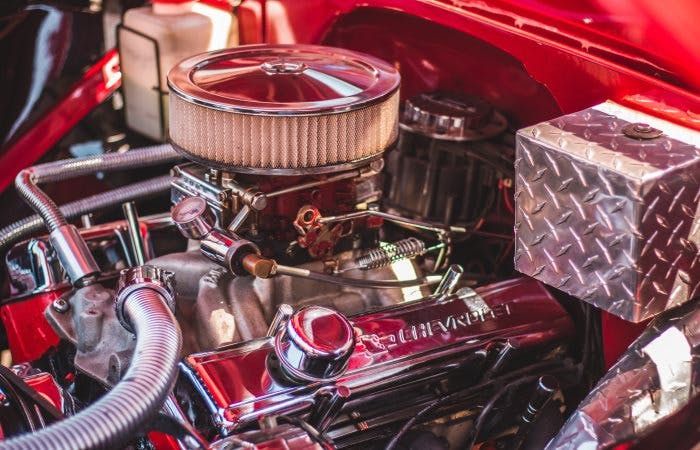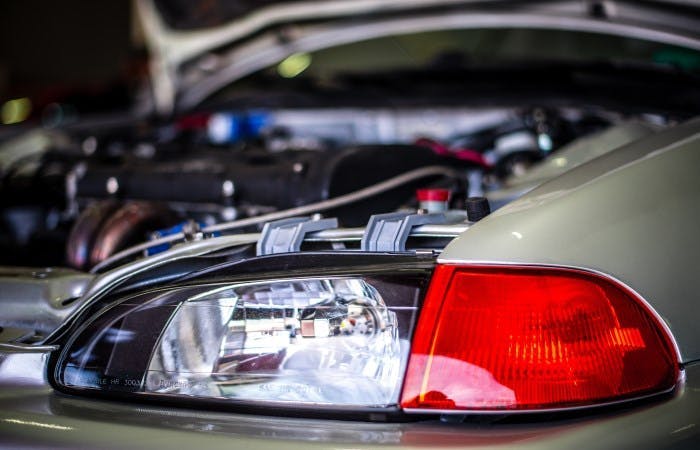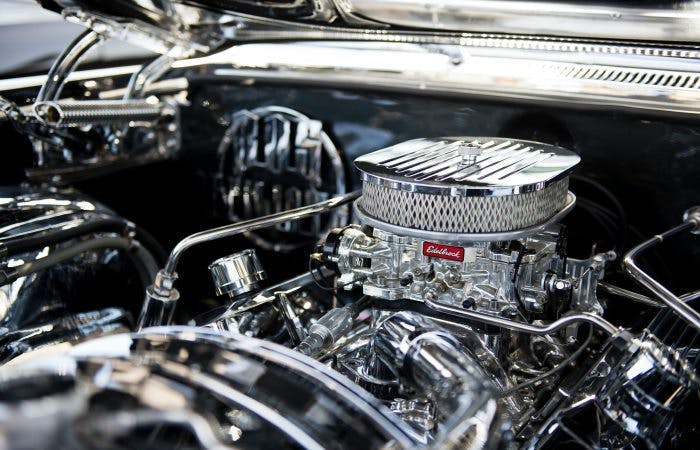
If you're looking into buying a new car, or even your first car, there are a lot of factors that need to be considered—from your budget, to the make and model, to the transmission. Another important area is car engine size. Your choice will determine your car's performance, fuel economy and overall value. So, if you want to make sure you're buying a car with an engine size that matches your needs, we're here to help!
We're going to walk you through exactly what engine size refers to and how it can affect you. We'll also offer some advice on what engine size might be best suited for your needs. Get the full lowdown below!
What does engine size mean?
Without getting too technical here, car engine size boils down to how much fuel and air can be pushed through a car engine's cylinders. The number of cylinders a car engine has can vary depending on the model. It's inside these cylinders where the fuel and air ignite in order to create the energy used to move your car.
The volume of fuel and air that can be pushed through the cylinders is measured in cubic centimetres. Engine sizes, however, are measured in litres and rounded up to the nearest tenth of a litre. So, if you had a 1580cc engine, it would instead be labelled as a 1.6 litre engine.
Typically, the larger the engine size, the more power you have at your disposal. After all, if it can push more air through your car's cylinders, you'll be able to burn more fuel. There are exceptions to every rule, of course. Many cars nowadays contain turbocharged engines. These engines are able to push extra air into your engine's cylinders, which enables them to burn more fuel. So, even if it's a relatively small engine, it can match the power of larger engines.
Engine sizes broken down
- 0 litre: the smallest engine size, usually found in the smallest car models around. They're typically the most economical size, as they burn far less fuel. They're ideal for town driving, stop-start traffic and short journeys.
- 0 to 2.0 litre: medium to large engines, allowing for quicker acceleration. Though they require more fuel, they're still relatively economical. They're suitable for a steady mix of town driving and motorway driving.
- 0 to 3.0 litres: larger engines that enable drivers to accelerate quickly, maintain high speeds and carry heavy loads. They tend to burn a lot more fuel as a result. They're ideal for driving long distances on motorways.
- 3+ litres: the largest engines which offer higher performance. They're mainly ideal for drivers who want a lot of power at their disposal, either for fast driving or for carrying heavy loads.
As we've mentioned, however, there are some cases in which the size of your engine isn't always an accurate measure of your car's power. Turbocharged engines often come with high performance and fuel economy without the added size. Their efficiency and power enable them to keep up with bigger engines, despite them often being much smaller.
What impact does my engine size have on…?

If you were thinking of picking your car engine size on a whim, think again! Your choice could have a huge impact on a wide variety of factors...
Cost of the car
Whether you're buying a new car or a used one, your budget is something you need to carefully calculate before making a single decision. Even if you're buying secondhand, cars can be very expensive. One factor that can increase the cost of a car is the engine size. As we've said, the larger the engine size, the more power you have at your disposal. This, unfortunately, comes with a hefty price tag. It's one of the reasons why young drivers are often urged to buy smaller models with small engines like the Fiat 500.
If you've got a tight budget, you'll want to avoid looking at cars with large engine sizes. Instead, opt for a smaller size, or, if you're still looking for high performance, you might want to try out a turbocharged engine.
Performance
When it comes to finding cars that offer the best performance, the usual rule of thumb is that the bigger the engine size, the more power you have. If you're aiming for fast acceleration and journeys at prolonged high speeds, engine sizes of 2.0 litres and above are the best bet. Drivers who aren't as fussed about long journeys or high speeds can't go wrong with smaller engine sizes.
There are, of course, exceptions to this rule. For starters, if you're looking at a car that was manufactured ten years ago with a 2.0 litre engine, it likely won't offer the same power as an engine of the same size or just below that was manufactured this year. The way in which engines have been designed have only improved in efficiency over the years. Additionally, with engine wear and tear, performance will undoubtedly suffer.
And, as we've touched upon earlier, the rise in popularity of turbocharged engines has changed the game slightly. You'll find that these types of engines, even those of 1.0 litres, can often match general engines with twice the capacity.
Fuel economy
Typically, you'll find that the larger car engine sizes use up the most fuel—especially if you're prone to quick acceleration and driving for long periods of time at maximum speeds. Smaller engines, by comparison, tend to be far more economical, as they don't tend to need as much fuel to run.
Of course, the complete opposite can be the case if you're using the engine improperly. Though a small engine burns less fuel, if you're using it on high-speed roads for longer journeys, it will need to work harder and burn more fuel. It's for this reason that you need to pick an engine size that suits your needs. If you don't, you'll end up forking out more for fuel than you should and it could lead to engine wear and tear.
It's not just your car engine size that can affect your fuel economy—your driving style also plays a big role. With that in mind, you might want to read up on our top ten tips to save fuel when driving.
Vehicle tax
Your vehicle tax will ultimately come down to when your car was first registered. If your car was registered before 1 March 2001, your tax rate will be based on your engine size. If it's less than 1549cc, then you'll have to pay £160. If it's over 1549cc, then it will be £265. (Both amounts are based on a single 12 month payment.)
If your car was registered between March 1 2001 and 31 March 2017, it will boil down to its fuel type and CO2 emissions. If your vehicle was registered from 1 April 2017, your first year tax rate will be based on your car's CO2 emissions and then a fixed second rate from then on. If you don't fancy paying a fortune in vehicle tax, you'll want to carefully consider engine size and carbon emissions.
For more information, read up on our guide to everything you need to know about vehicle tax.
Insurance
Many factors go into the calculation of car insurance—from your age to your occupation to your location. Though it probably wouldn't have crossed your mind, your car engine size can also play a role in these calculations. Vehicles with large engine sizes are often labelled high risk by insurers. If you're capable of accelerating so quickly, you might be more likely to end up in an accident. (Whether it's due to your own risky behaviour, or because you lost control of the car.)
If you're a young driver, you might as well wave goodbye to getting a car with a large engine size immediately. Young drivers have the highest insurance premiums around because they're the riskiest age group. Insurers will hike up your premiums if you have a large car engine size. In fact, some insurers will simply turn you away if you attempt to insure a car with an engine over 2.0 litres.
If you've got your heart set on a car with a large engine size, but you don't want to have to pay hefty premiums, we've got just the thing for you! Our top 10 tips for saving money on your car insurance will help you enjoy much lower premiums!
What engine size is best for me?

Though there are plenty of factors that can play into your engine size choice, it mainly comes down to what you intend to use your car for and how much you're willing to spend.
What are you using your car for?
Town driving, short commutes and errands
If you're someone who sticks close to home when driving, there's not much point in you forking out for a larger car engine size. Small engines are ideal for town driving, stop-start traffic and short trips. That's not to say that you won't be able to go out onto the motorway. You just won't be able to stay at higher speeds for a long duration of time.
Of course, if you're only driving short distances and you're looking for a way to be more eco-friendly, you might want to eschew petrol and diesel engines entirely and instead look towards electric and hybrid cars.
Motorway driving and long journeys
If you like to take the odd road trip, or you find yourself driving on the motorway every day, you'll have no choice really but to opt for a larger engine size. You simply won't get the power needed to travel at high speeds (and maintain it) with a smaller engine. Unless, of course, you opt for a turbocharged engine.
If you're towing a trailer or caravan, for example, then you'll likely need to look at car engine sizes on the larger end of the spectrum. You're going to need a lot of power to carry heavy loads, especially if you're doing so on high speed roads.
FAST DRIVING
If you're eager to become a character in the Fast and Furious, and high revs and performance is all you care about, then you might as well ignore any engine size that's under 2.0 to 2.5 litres. If that's the case, you're likely going to want to look at sports cars.
How much do you want to spend?
Low range budget engines
If saving money is a top priority of yours, then you'll want to stick to lightweight cars with smaller engine sizes, e.g., hatchbacks. Their upfront cost tends to be lower than cars with larger engines. You can also enjoy lower insurance premiums, as insurers will likely see it as low risk. (Obviously, this depends on whether or not the insurer views you as a high risk driver.) Plus, it will save you money through lower fuel costs!
Medium range budget engine
If you're not looking to go crazy with your budget, but you'd prefer to have a vehicle with better performance than those with small engines, look for something in the middle. Turbocharged engines often offer drivers the best of both worlds—you get a small engine, plenty of power and you're not using as much fuel as a large engine.
High range budget engines
If money is of no consequence to you, then feel free to pick out a car with whatever engine size you'd like. Be sure to think about what you're using your car for, though. If you're not travelling far, it's probably a waste of money buying an SUV or estate with a large engine. Additionally, you'll want to remember that the more you're spending on your car, the higher your insurance premiums will be. Before you buy any car, you should look at some insurance quotes to make sure you'd be able to afford to buy it and insure it.
Subscribe for driving advice, offers & more
We'd love to let you know about our courses, news and offers via email. You may unsubscribe at any time.
Star Genie Limited trading as PassMeFast. Company number 10093359
Copyright © 2024 owned by Star Genie Limited
PassMeFast, Blue Tower, MediaCityUK, Salford, M50 2ST

